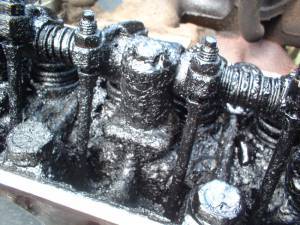Problems with Sludge Formation and Oil Starvation in Gasoline Engines
We have seen and heard about a recent spate of problems with oil system sludges plugging oil passages and pumps in certain vehicles.
The engines of today place a huge load on motor oils. Higher revving engines, high heat, reduced oil capacity in some engines, and the higher loads placed on the additive packages used in motor oils have stretched performance to the breaking point. The gasoline’s sold today have lower amounts of detergent-dispersants than at any time in the last ten years. There are also more contaminants including sulfur in these gasoline’s, all of which make it harder for oil to do its job.
As todays gasolines are burned they produce more by-products which the oil must breakdown and hold in suspension until the next oil change.
There is quite a bit of truth to the old adage about motor oil never really wearing out. Motor oil that is effectively filtered can be used for a very long time. The problem is that the detergent-dispersant, anti-corrosive, extreme pressure lubricating package and other additive components get used up. As these components get used up the oil can no longer protect the engine or break-down and hold all of the contaminants in suspension. When this happens the contaminants begin to deposit themselves throughout the engine.
These contaminants tend to build up first in the small passages and places in the engine where the oil naturally pools. As this process goes forward this build-up restricts oil flows and inhibits proper lubrication. Without an effort to remove these restrictions it can quickly lead to increased engine wear and possibly catastrophic component and engine failures.
With engines that have a history of these type of problems there are several things that can be done to prevent problems and remediate existing problems.
One of the simplest and least expensive ways to prevent these problems is to use the highest quality oils and filters available and change them regularly at 3000 miles or even less under extreme operating conditions.
Another suggestion is to use API CI-4 Diesel Engine Oil in place of the automotive gasoline engine oils. Diesel engines produce far more contaminants than the typical gasoline engine. As a result high quality diesel engine oils use a better base stock and a much better additive package than gasoline engine oils. As long as you keep the viscosities within the suggested range of the engine manufacturer you will protect your warranty and your engine.
Enertech Labs, Inc. manufacturers engine flush products that can be used with or without flushing equipment. Our Engine Flush product will quickly breakdown sludges throughout the engine and suspended them for elimination through draining of the engine oil.
For dealers and service shops Well Worth has teamed with RTI Products, Inc. to offer a training, equipment and flush product package that will allow your technicians to provide a service that quickly and completely breaks down and removes sludges and contaminants. This process can thoroughly and quickly clean even the worst engines.
This service will extend engine life and improve performance quickly, easily, and safely.
Contact Well Worth Today for more information on how this system, training, and products can improve your operations and increase your profits.


